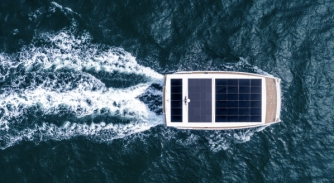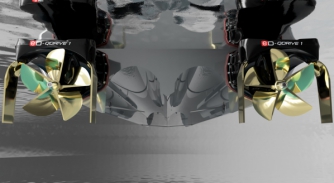Life Cycle Thinking
The narrative around green tech solutions for the energy transition in the superyacht industry is overly simplistic, we need to embrace the complex reality…
The recent focus on the true sustainability of batteries, culminating in new EU regulations, underscores the importance of understanding the entire life cycle of products. The scrutiny and then inevitable regulations reinforce the need to supply chain-wide awareness of the total lifecycle of green technology solutions.
The regulations from the European Parliament and the Council will apply to all batteries, including all waste portable batteries, batteries for electric vehicles, industrial batteries, starter, lighting and ignition (SLI) batteries - mainly used in vehicles and machinery - and batteries for light transport vehicles. The stated aim is to regulate the entire life cycle of batteries, from production to reuse and recycling to ensure that they are safe, sustainable and competitive.
"Batteries are key to the decarbonisation process and the EU's shift towards zero-emission modes of transport. At the same time, end-of-life batteries contain many valuable resources and we must be able to reuse those critical raw materials instead of relying on third countries for supplies. The new rules will promote the competitiveness of European industry and ensure new batteries are sustainable and contribute to the green transition," said Teresa Ribera, Spanish Minister of Ecological Transition, currently heading the EU Presidency.
While the increased use of batteries potentially provides a greener onboard energy storage solution, their production and disposal phases can hold significant environmental repercussions. If mismanaged, these impacts might even outweigh the benefits compared to traditional fossil fuels.
Enter the concept of life cycle thinking: a comprehensive approach that examines the entire journey of a product or service—from raw material extraction and production to its use and ultimate disposal. In our race towards green transition, while some options may appear to be straightforward sustainable choices, they can harbour latent impacts that negate their perceived advantages. Much depends on how these choices are implemented.
Take methanol and hydrogen as fuel sources: when produced and processed with renewable power, they can yield considerable savings due to minimal emissions. However, resort to fossil fuel-derived power for their production, and the advantages significantly diminish.
The complexity of sustainable choices and the fear of unintended consequences may deter some from taking action. Instead of this paralysis, a more pragmatic approach is to employ life cycle thinking, tailoring solutions to individual cases. Such discernment can pave the way for impactful collective actions in our green transition journey.
The eco-friendly choices we make often hinge on broader considerations than merely assessing whether option A is superior to option B. The answer usually starts with an “it depends”. For instance, while batteries pose environmental challenges during production, their overall impact depends on optimising their usage phase to counterbalance and surpass this initial environmental debt.
Let's take another, less serious example: reusable drink bottles onboard yachts. Championed by many yachts as an easy first step on the path to sustainability, the metal versus plastic debate is another example of a lack of life cycle thinking.
Metal bottles have a much higher initial environmental footprint than their plastic counterparts. However, their durability extends their usage phase and their recyclability offers a gentler end-of-life phase, making them a potentially more sustainable choice in the long run, but not so simple as metal = good, plastic = bad.
The path to sustainability isn't a binary one with clear rights or wrongs. It's an intricate journey demanding interrogation and cost-benefit analysis. By evaluating which options align best with sustainability goals and understanding how to maximize their benefits, the superyacht industry can chart a more responsible course forward.
NEW: Sign up for SuperyachtNewsweek!
Get the latest weekly news, in-depth reports, intelligence, and strategic insights, delivered directly from The Superyacht Group's editors and market analysts.
Stay at the forefront of the superyacht industry with SuperyachtNewsweek
Click here to become part of The Superyacht Group community, and join us in our mission to make this industry accessible to all, and prosperous for the long-term. We are offering access to the superyacht industry’s most comprehensive and longstanding archive of business-critical information, as well as a comprehensive, real-time superyacht fleet database, for just £10 per month, because we are One Industry with One Mission. Sign up here.
Related news

Stream Marine Training demands change
The maritime training firm has called for immediate updates to fire safety training following the death of a seafarer
Crew

EU sets new battery sustainability regulations
After an EU Parliament vote, the European Council adopts new regulations strengthening sustainability rules for battery use and waste
Technology

Silent Yachts boosts production
The electric multihull manufacturer has several new launches scheduled in 2023 after consolidating ownership of its Italian shipyard
Business

Are lithium-ion batteries on yachts safe?
Pantaenius UK shares insights from an expert marine industry panel
Crew

eD-TECH to develop battery system
A new partnership between eD-TEC and EBS aims to produce marine e-drive specific battery solution
Technology
Related news
Stream Marine Training demands change
2 years ago
EU sets new battery sustainability regulations
2 years ago
Silent Yachts boosts production
2 years ago
Are lithium-ion batteries on yachts safe?
2 years ago
eD-TECH to develop battery system
2 years ago
NEW: Sign up for
SuperyachtNewsweek!
Get the latest weekly news, in-depth reports, intelligence, and strategic insights, delivered directly from The Superyacht Group's editors and market analysts.
Stay at the forefront of the superyacht industry with SuperyachtNewsweek



